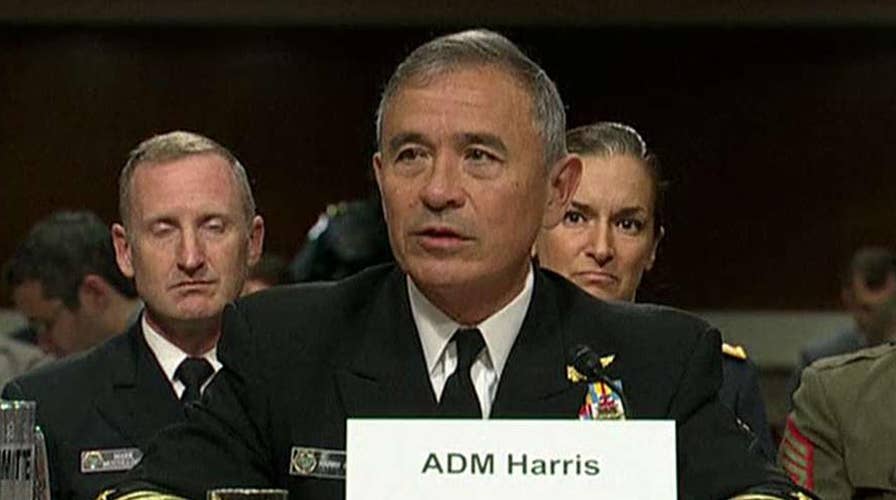US military concerned by threat North Korea poses to Hawaii
Insight from The Washington Post's Dan Lamothe
The senior U.S. Navy officer overseeing military operations in the Pacific region told lawmakers Thursday that the North Korean crisis is the worst he’s seen -- testifying that it's only a matter of time before Kim Jong Un has the capability of launching a nuclear warhead toward the United States.
“The crisis on the Korean peninsula is real—the worst I’ve seen,” said Commander of U.S. Pacific Command Adm. Harry B. Harris Jr. “There is some doubt within the intelligence community whether Kim Jong Un has that capability today or whether he will soon, but I have to assume he has it, the capability is real, and that he’s moving towards it.”
Harris spoke to the Senate Armed Services Committee a day after all 100 U.S. senators were invited to White House grounds for a North Korea briefing.
Harris declined to compare the current situation to that of the Cuban Missile Crisis decades ago, but said he has “no doubt” the country intends to develop nuclear missiles that could be aimed toward South Korea and the U.S.
Harris said he believes "America's future is linked" to the Pacific, even noting a possible migration of Islamic State militants back to the region as U.S. forces push to regain former ISIS territory in the Middle East.
But Harris said that North Korea remains "the most immediate threat" to U.S. security, as they "vigorously" pursue strikes and launches intended to target Australia, South Korea, and the U.S.
"Kim Jong Un is making progress and all nations need to take this seriously because their missiles point in all directions," Harris said. "If left unchecked, they will match the capability of his hostile rhetoric."
Harris underscored the importance of what he referred to as a “shift” in Kim Jong Un’s rhetoric, after threatening nations like Australia and the U.S. by name this week.
“His rhetoric is going in one direction and his capabilities are approaching the lines of his rhetoric,” Harris said. “Where those lines cross, I believe we are at an inflection point and we wake up to a new world.”
Despite the gravity of the threat North Korea continues to pose, Harris voiced confidence in U.S. defense plans, and said President Trump and Defense Secretary Mattis have made it clear that "all options are on the table."
"We want to bring Kim Jong Un to his senses -- not to his knees," Harris said. "I have the forces in place to fight tonight if necessary.”
Harris pushed, throughout the hearing, the need to repeal the sequester and for Congress to pass a budget that would provide the Department of Defense with more resources, saying that additional materials are needed “in the long-run.”
Harris told the House Armed Services Committee on Wednesday that the U.S.–delivered THAAD anti-ballistic missile system being installed in South Korea would be operational in “a couple of days.”
“THAAD allows us intercept capability to shoot down, at the high altitude level, ballistic missiles that go from North Korea to South Korea,” Harris explained. “THAAD is a system that would give an umbrella to protect South Korea.”
Harris said that China is as responsible for where North Korea is today, but seemed to applaud Trump for his efforts to win cooperation from Chinese President Xi Jinping.
“We’re seeing more activity—positive activity—from China in this case than we’ve seen in a long time,” Harris said. He said he remains “cautiously optimistic, but hopeful” and said it was too early to tell.













































